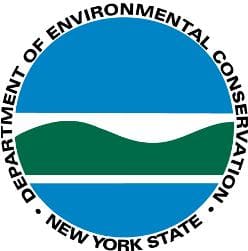New York DEC Continues to Re-Open Shellfishing Area North Shore Areas in Nassau County Available for Harvesting
OutdoorHub 11.19.12

The New York State Department of Environmental Conservation (DEC) today announced it has rescinded temporary emergency shellfish closures that were implemented in response to the coastal flooding and power outages caused by Hurricane Sandy. DEC had initially implemented the shellfishing closures on Monday, October 29 to protect public health. Many areas were reopened over the past two weeks based on the bacteriological examination of water samples.
DEC collected additional water samples in two closed areas last Friday. Testing of those samples showed that water quality in those areas was suitable for harvesting shellfish. Effective on Monday, November 19 the harvest of shellfish is permitted in the following areas:
- Town of North Hempstead: All the normally certified shellfish lands in outer Hempstead Harbor and the adjacent section of Long Island Sound.
- Town of Oyster Bay (north shore): All the normally certified shellfish lands in outer Hempstead Harbor and the adjacent section of Long Island Sound; and, all the normally certified shellfish lands in Cold Spring Harbor.
- Town of Huntington: All the normally certified shellfish lands in Cold Spring Harbor.
However, several areas remain closed to the harvest of shellfish, through November 21, including: The northern portion of Orient Harbor in the Town of Southold; and, all of Accabonac Harbor in the Town of East Hampton. Additionally, the following enclosed bays along the southern shore of Long Island remain closed: Hempstead Bay, South Oyster Bay, Great South Bay, Nicoll Bay, Patchogue Bay and Bellport Bay.
The closures were implemented and extended to protect the public health. The strong easterly winds, full moon and storm surge caused by Hurricane Sandy caused significant coastal flooding that inundated septic systems and wastewater treatment systems in some low lying areas. Sewage treatment plants experienced temporary bypasses causing less than fully treated sewage to be discharged into certain shellfishing areas. When water quality in the enclosed creeks, coves, harbors and bays is adversely affected by such discharges, shellfish in those areas have an increased potential to be hazardous for use as food.
DEC will continue to collect water samples from closed areas for bacteriological testing this week. Additional areas will be re-opened as soon as possible based on the results of the laboratory analyses of those samples.
A recorded message advising harvesters of the status of these shellfish areas may be heard at (631) 444-0480. The message will be updated during the course of the temporary closures. If you would like a more detailed description of the closed areas please call the office during normal business hours at (631) 444-0475.
Additionally, information about temporary closures is available on DEC’s website at: http://www.dec.ny.gov/outdoor/7765.html

